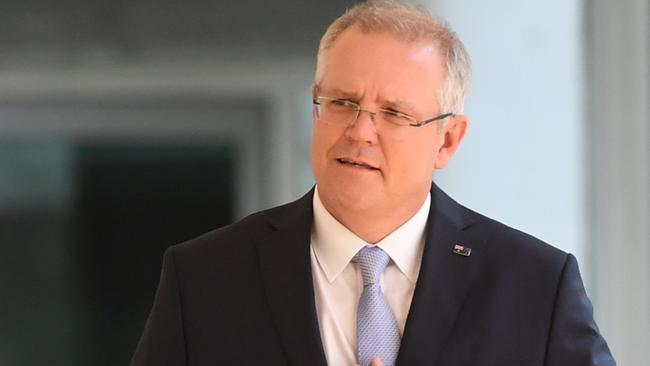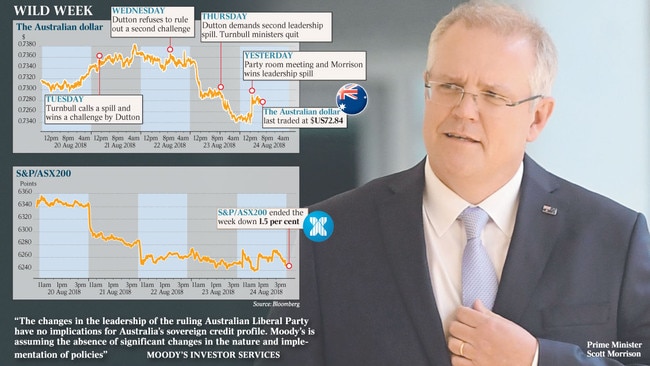Relief over Morrison’s victory as corporate leaders call for stability
Business leaders have stressed the critical importance of political stability after Scott Morrison’s victory yesterday.

Business leaders have stressed the critical importance of political stability and progress on economic reforms after Scott Morrison yesterday became Australia’s third prime minister in a little over three years.
After a wild week equity and currency markets rallied, signalling their preference for the ex-federal treasurer over his conservative arch-rival Peter Dutton.
But the business community lamented the erosion of the nation’s global competitiveness after a decade of turmoil and policy gridlock in Canberra.
Long-neglected reforms to the tax system, energy supply and the education sector topped the business community’s wish-list.
Stability, however, overrode everything, with Westpac chief executive Brian Hartzer saying the economy needed certainty to attract investment and for businesses to take risks.
“Political stability plays an important part in this,” Mr Hartzer said. “We welcome the continuity Scott Morrison will bring in his role as prime minister.”
Brambles chief executive Graham Chipchase blamed the recent political turbulence for upending the national energy guarantee and planned corporate tax cuts.
“From a business perspective, what we always want is stability, and if you haven’t got that at least some sort of plan so you know when you’re going to get stability,” Mr Chipchase said. “This lack of stability is clearly not a good thing for business.”

Australia Post chief executive Christine Holgate echoed the Brambles chief, saying the nation needed strong government. “We can’t be a strong country without it,” Ms Holgate said.
Mr Morrison declined to sketch out policy details yesterday, other than to make a broad commitment to “stability of government” with “points of emphasis and direction”.
Asked if the NEG was still official policy, he said prices would fall and pledged to “put the big stick to energy companies to do the right thing by customers”.
“We will ensure we’re backing in investment in new energy-generation capacity,” he said.
“On specific matters of policy and any changes in that area, I will consult with my new Cabinet.”
Markets initially warmed to Mr Morrison’s victory in the Liberal Party leadership spill, which he won by a margin of 45 votes to 40.
The dollar quickly retraced some of its losses, gaining a quarter of a US cent after slumping 1.4 per cent overnight on fears that the less market-friendly Mr Dutton would become prime minister.
The benchmark S&P/ASX200 reversed its early decline, but closed only 2.9 points higher at 6247.3 points at the end of a rollercoaster day.
JP Morgan Asset Management global market strategist Kerry Craig said the near-term market reaction to political upheaval was nearly always negative, but in this case investors were taking the leadership change in their stride as it was widely anticipated.
“Even if there is a sell-off in the coming days, the negative reaction doesn’t always persist for long and may not be the biggest determinant of how markets behave in medium term, Mr Craig said.
“Political changes may swing sentiment, but they don’t alter the fundamentals of the local economy or corporate outlook. Unless there is assumed to be a large change in monetary or fiscal policy or the regulatory backdrop in the near term, investors will go back to focusing on what is important — the health of the economy and corporate fundamen-tals.”
National Australia Bank’s chief markets economist, Ivan Colhoun, said that Mr Morrison was more of a “known quantity” who’s less likely to make radical shifts in policy than Mr Dutton.
“Importantly, Morrison did not bring down the prime minister, which is a different situation than would have existed if Dutton had won,” said Mr Colhoun. The consensus yesterday was that Mr Morrison was unlikely to make radical policy changes, in contrast to the populist proposal floated by Mr Dutton this week to remove the GST on power bills at an estimated cost of $7.5 billion.
Ernst & Young chief executive and managing partner Tony Johnson called for the introduction of business-friendly reforms.
“There remain major challenges for the nation to resolve when it comes to tax reform, international competitiveness, cutting red tape and securing energy supply,” Mr Johnson said.
“Most importantly the business community needs policy certainty to promote investment and improve business confidence.”
Mr Chipchase said the tone of the nation’s politics was tracking a broader shift to the right in the US and Europe.
“I think what’s going on in this country is no different to what’s been going on in the UK, France, Germany and the US and many other countries,” he said.
“I think it makes our job that much more difficult not knowing what the rules might be, for example, in tax going forward.”
Australian Industry Group chief executive Innes Willox said the new PM had inherited an economy in good shape but not without its challenges.
A top priority, he said, should be building a stronger economy and inclusive society.
“For business, we hope the new administration will among other things focus on navigating a way to broader tax reform, delivering affordable energy and addressing the gaps in our education and training system which are contributing to ongoing skill shortages,” Mr Willox said.
Costa Group chief executive Harry Debney said the latest leadership change was disappointing because it meant unstable government and poor policy execution.
Global credit rating agency Moody’s said there were no implications for Australia’s sovereign credit profile from Mr Morrison’s ascension, provided there were no radical policy shifts.
The nation’s Aaa rating, it said, was supported by the country’s very high level of economic strength and moderate level of government debt.
Further, the strength of Australia’s institutions took into account some political fragmentation that, in recent years, had constrained the capacity of successive governments to pursue policy changes, the agency said.
Additional reporting: Damon Kitney, Perry Williams, David Rogers


